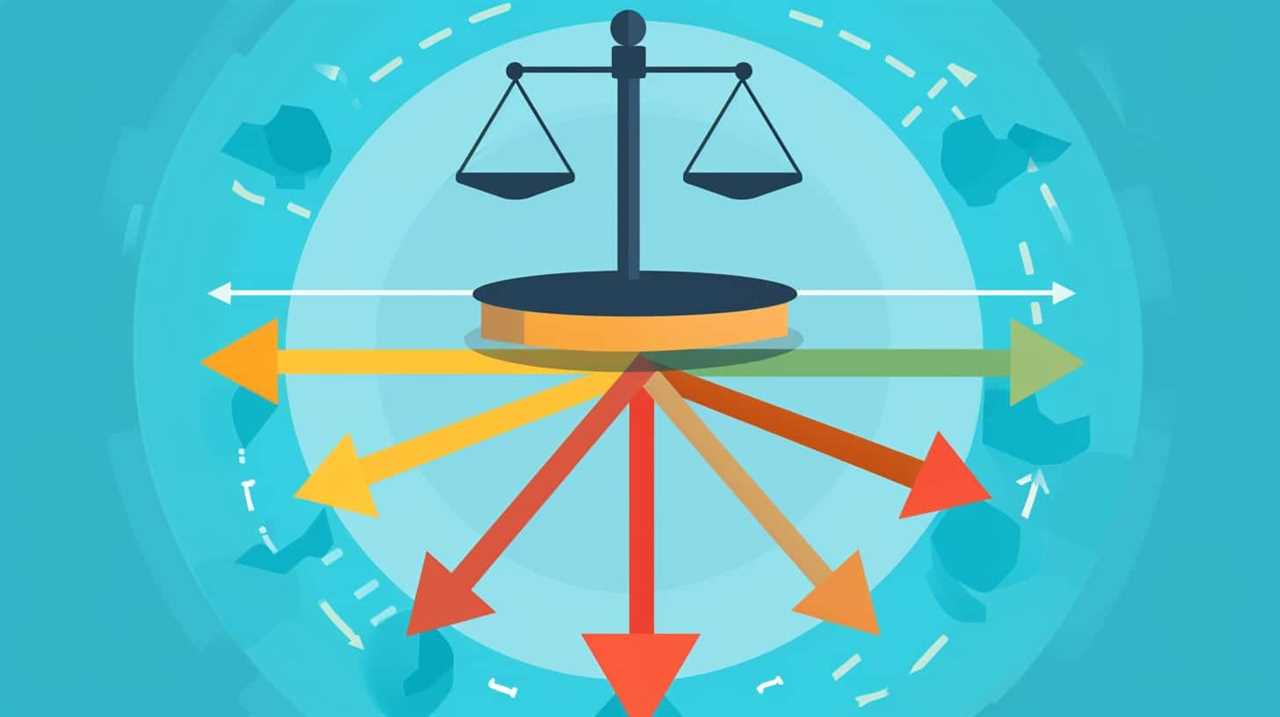By chance, we have discovered the key to mastering economic strategy: utilizing Nash Equilibrium. If you aim to excel in the world of economic decision-making, then search no more. Nash Equilibrium, a concept introduced by the genius John Nash, has the potential to transform your strategic thinking approach.
In this captivating journey, we will explore the intricacies of Nash Equilibrium and its application in maximizing payoff in competitive situations. We will delve into the delicate balance between cooperation and self-interest, as well as the role of rationality in achieving equilibrium.
Prepare to conquer oligopolistic markets and elevate your business strategies to unparalleled heights. Get ready to embrace the wisdom of John Nash and embark on a path towards economic strategy mastery.
Key Takeaways
- Nash Equilibrium revolutionizes decision-making and maximizes strategic advantage in economic strategies.
- Understanding Nash Equilibrium allows for strategic maximization of payoff and outsmarting competitors.
- Nash Equilibrium assumes rationality and perfect information, but real-world situations may not always align with these assumptions.
- Balancing cooperation and self-interest is crucial in economic strategizing, requiring a careful alignment of individual incentives with group goals.
Understanding Nash Equilibrium
To fully grasp the concept of Nash Equilibrium, we must start by examining its definition and fundamental principles. Nash Equilibrium, named after the mathematician John Nash, is a concept in game theory that describes a state in which no player has an incentive to unilaterally deviate from their chosen strategy. In other words, it’s a stable outcome where each player’s strategy is the best response to the strategies chosen by others.

One application example of Nash Equilibrium is in oligopoly markets, where a few firms dominate the industry. These firms must carefully consider their pricing and production decisions to maximize their profits. By analyzing the Nash Equilibrium, firms can determine the best strategy to adopt in order to achieve a stable market outcome.
However, it’s important to acknowledge the limitations and criticisms of Nash Equilibrium. One limitation is that it assumes rationality and perfect information, which may not always hold in real-world situations. Additionally, there may be multiple Nash Equilibria in a game, making it challenging to determine which outcome will actually be reached.
Despite its limitations, Nash Equilibrium remains a powerful tool for analyzing strategic interactions in various fields, such as economics, politics, and biology. By understanding its definition, application examples, and limitations, individuals can develop a deeper mastery of this concept and apply it effectively in decision-making processes.
The Concept of Strategic Decision-Making
Strategic decision-making plays a crucial role in harnessing the power of Nash Equilibrium for economic strategy mastery. Understanding decision-making processes, strategic thinking, and analysis are key components in developing effective economic strategies.

Strategic decision-making involves evaluating various options and selecting the best course of action to achieve desired outcomes. It requires a deep understanding of the current economic landscape, market trends, and the behavior of other players in the industry.
To make strategic decisions, one must engage in thorough analysis, considering both internal and external factors that may impact the success of the chosen strategy. This includes analyzing market conditions, competitive landscape, customer preferences, and technological advancements. Strategic decision-making also involves anticipating potential risks and uncertainties and developing contingency plans to mitigate them.
By applying strategic thinking and analysis to decision-making processes, individuals and organizations can identify opportunities and make informed choices that align with their long-term goals. This strategic approach enables them to navigate complex economic environments and gain a competitive advantage.
Transitioning into the subsequent section about applying Nash Equilibrium to economic strategies, understanding strategic decision-making provides a solid foundation for effectively applying Nash Equilibrium principles.

Applying Nash Equilibrium to Economic Strategies
As we delve into the application of Nash Equilibrium to economic strategies, it becomes clear how this concept can revolutionize our approach to decision-making and maximize our strategic advantage. Nash Equilibrium provides us with a framework to analyze and understand the behavior of economic agents in competitive situations. By considering the interplay between different players and their strategies, we can identify stable outcomes where no individual has an incentive to unilaterally deviate from their chosen strategy.
When applied to economic competition, Nash Equilibrium allows us to determine the optimal course of action for our own strategic decision-making. It helps us anticipate the actions of our competitors and choose the most advantageous strategy to achieve our objectives. This concept enables us to analyze various economic scenarios, such as pricing decisions, market entry strategies, and resource allocation strategies, with a focus on maximizing our payoff.
In economic competition, strategic decision-making becomes crucial for success. Nash Equilibrium allows us to understand the dynamics of this decision-making process and identify the best strategies to adopt. By carefully considering the choices and incentives of all players involved, we can achieve a position of strength and ensure our actions align with the equilibrium outcome.
Transition: Now that we understand the application of Nash Equilibrium to economic strategies, let’s explore how it can be used to maximize payoff in competitive situations.

Maximizing Payoff in Competitive Situations
By understanding Nash Equilibrium, we can strategically maximize our payoff in competitive situations. In order to outsmart our competitors and achieve the highest possible payoff, it’s crucial to employ effective strategies and understand the psychology behind competitive decision making.
To begin with, one strategy for outsmarting competitors is to carefully analyze the game and identify potential outcomes and payoffs for each decision. This allows us to anticipate our competitors’ moves and plan our own moves accordingly. By considering all possible scenarios, we can make informed decisions that maximize our chances of achieving a favorable outcome.
Additionally, understanding the psychology of competitive decision making can give us an edge over our rivals. By studying human behavior and cognitive biases, we can exploit weaknesses in our competitors’ decision-making processes. For example, if we know that our competitors are prone to taking risks, we can adjust our strategy to capitalize on this tendency and secure a higher payoff.
Furthermore, it’s important to remain adaptable and flexible in competitive situations. By continuously monitoring and evaluating our competitors’ actions, we can adjust our strategies accordingly. This allows us to stay one step ahead and seize opportunities as they arise.

Balancing Cooperation and Self-Interest
In balancing cooperation and self-interest, we’re faced with the challenge of finding the right equilibrium between collaboration and competition.
While cooperation can lead to collective success and shared gains, self-interest drives individuals to pursue their own goals and maximize personal benefits.
The key is to strike a balance that allows for both individual success and collaboration, where each party can achieve their goals without undermining the overall cooperation.
Cooperation Vs Competition
Our team’s exploration of cooperation versus competition in economic strategy reveals the delicate balance between self-interest and collaboration. In the realm of economic decision-making, individuals often face a choice between working together towards a common goal or pursuing their own interests. It’s crucial to strike a balance between these two approaches in order to achieve optimal outcomes.

Cooperation vs competition:
- Cooperation involves individuals or entities working together towards a shared objective, pooling resources and expertise for mutual benefit.
- Competition, on the other hand, emphasizes individual pursuit of success, often resulting in a zero-sum game where one’s gain is another’s loss.
Collaboration:
- Collaboration fosters innovation and creativity, allowing for the exchange of ideas and the pooling of diverse perspectives.
Self-interest:
- Self-interest drives individuals to maximize their own gains, leading to efficiency, motivation, and personal satisfaction.
To navigate this delicate balance, economic strategists must carefully consider the context, weighing the benefits of collaboration against the potential advantages of self-interest. Ultimately, mastery of this dynamic enables one to optimize their economic strategy and achieve sustainable success.

Self-Interest and Collaboration
We strive to strike a delicate balance between self-interest and collaboration when considering economic strategies. Collaboration and competition are both essential components of any economic system. While collaboration promotes cooperation and collective decision-making, competition drives innovation and efficiency.
However, it’s crucial to recognize that individual incentives and group outcomes are interconnected. Incentives that solely focus on individual gains can lead to a lack of collaboration and an overall decline in group outcomes. On the other hand, excessive collaboration without considering individual interests may stifle individual motivation and hinder innovation.
Therefore, achieving mastery in economic strategy requires finding a middle ground where self-interest and collaboration work in harmony. By aligning individual incentives with group goals and fostering an environment that encourages cooperation and competition, we can optimize outcomes and achieve sustainable economic growth.
Balancing Individual Goals
How can we effectively balance cooperation and self-interest when pursuing individual goals in economic strategy?

Balancing personal interests with the goal of achieving long-term goals requires careful consideration and strategic thinking. Here are three key strategies to help strike the right balance:
- Prioritize collaboration: While self-interest is important, it’s crucial to recognize the benefits of cooperation. By actively seeking opportunities for collaboration and building strong relationships, we can achieve more collectively while still addressing our individual goals.
- Adopt a win-win mindset: Instead of viewing cooperation as a zero-sum game where one person’s gain is another’s loss, we can strive for mutually beneficial outcomes. This mindset encourages creative problem-solving and fosters a positive environment for cooperation.
- Establish clear boundaries: Balancing personal interests doesn’t mean sacrificing individual goals entirely. It’s essential to set clear boundaries and communicate our needs and expectations effectively. This ensures that our personal interests are respected while still contributing to the collective goals.
By implementing these strategies, we can navigate the delicate balance between cooperation and self-interest, ultimately leading to success in achieving our long-term goals.
Transitioning into the subsequent section about evaluating the impact of information asymmetry, we must also consider how understanding and managing information disparities can further enhance our ability to balance individual goals effectively.
Evaluating the Impact of Information Asymmetry
When evaluating the impact of information asymmetry in economic contexts, it becomes evident that this imbalance can have significant implications on market outcomes and decision-making processes.

The presence of information asymmetry can lead to adverse selection, moral hazard, and market inefficiencies.
To address this issue, various strategies can be employed to reduce information asymmetry, such as promoting transparency, enhancing communication channels, and implementing mechanisms that incentivize the disclosure of relevant information.
Information Asymmetry’s Economic Implications
The impact of information asymmetry on the economy can be evaluated through a comprehensive analysis of its economic implications. Information asymmetry refers to a situation where one party has more information than the other, resulting in an information advantage.
This can lead to several economic consequences:

- Market inefficiency: Information asymmetry can create distortions in the market, as some participants may make decisions based on incomplete or incorrect information. This can result in misallocation of resources and suboptimal outcomes.
- Adverse selection: In situations where one party possesses superior information, they may selectively engage in transactions that are more favorable to them, while avoiding transactions where they have a disadvantage. This can lead to adverse selection and market failures.
- Moral hazard: When one party has an information advantage, they may have a greater ability to take risks or engage in opportunistic behavior, knowing that the other party is unaware of the full picture. This can result in moral hazard and undermine trust in economic transactions.
Understanding and addressing the economic implications of information asymmetry is crucial for achieving a more efficient and equitable economy.
Strategies to Reduce Asymmetry
Reducing information asymmetry involves implementing strategies that address the impact of unequal information distribution on economic outcomes. To minimize information asymmetry, organizations can adopt various strategies for information sharing.
One effective approach is to increase transparency by providing clear and accurate information to all relevant stakeholders. This can be achieved through regular reporting, disclosure of relevant data, and open communication channels.
Additionally, organizations can establish mechanisms for feedback and verification to ensure the accuracy and reliability of shared information.

Another strategy is to promote education and awareness among stakeholders, enabling them to make informed decisions and understand the implications of information asymmetry.
Analyzing Game Theory in Economic Contexts
By analyzing game theory in economic contexts, we gain a comprehensive understanding of strategic decision-making processes and their impact on economic outcomes. Game theory, which originated in the field of economics, has since been applied to various disciplines, including political science and business management.
In non-economic contexts, strategic decision-making plays a crucial role in shaping outcomes just as it does in economic situations. For example, in politics, game theory is used to analyze the strategic decisions made by political actors, such as governments and interest groups, to achieve their objectives and gain an advantage over their opponents. Game theory provides a framework for understanding the incentives, interactions, and potential outcomes of different strategies, allowing us to predict and evaluate the outcomes of political strategies.
Analyzing game theory in economic contexts also sheds light on the dynamics of markets and the concept of Nash equilibrium. Nash equilibrium, a central concept in game theory, occurs when each player in a game has chosen a strategy that’s optimal given the choices of the other players. Understanding Nash equilibrium is essential for analyzing market dynamics, as it helps us predict the outcomes of strategic interactions between buyers and sellers.

Nash Equilibrium and Market Dynamics
When examining Nash Equilibrium in the context of market dynamics, we can observe its practical applications in game theory.
By understanding the concept of Nash Equilibrium, we can identify the optimal decision-making strategies for all participants in a market.
This enables us to analyze and predict the outcome of market interactions, allowing for more informed economic strategies.
Game Theory Applications
In our pursuit of economic strategy mastery, we can harness the power of game theory applications. Specifically, by understanding the dynamics of Nash equilibrium and its impact on markets.

Game theory provides a framework for analyzing strategic interactions and decision-making in various scenarios. It can help us understand how different actors strategically choose their actions to maximize their outcomes in political scenarios. For example, game theory can be applied to analyze the behavior of political parties during elections or the bargaining between countries in international relations.
Additionally, game theory can also be used to address environmental issues. By modeling the interactions between stakeholders, game theory can help identify optimal strategies for managing common resources and mitigating environmental challenges.
Optimal Decision-Making Strategies
We can achieve optimal decision-making strategies by harnessing the power of Nash equilibrium and understanding market dynamics.
In order to make the best decisions, it’s important to have a deep understanding of the information processing and risk management involved in the market. Information processing refers to the ability to gather, analyze, and interpret data in a timely and accurate manner. By effectively processing information, we can identify patterns and trends that will inform our decision-making process.

Risk management, on the other hand, involves assessing and mitigating potential risks associated with our decisions. By understanding the potential risks and implementing appropriate risk management strategies, we can minimize the negative impact of uncertain events on our outcomes.
Achieving mastery in decision-making requires a comprehensive understanding of both information processing and risk management in the context of Nash equilibrium and market dynamics.
Exploring Dominant and Mixed Strategies
How can we effectively explore dominant and mixed strategies when harnessing Nash Equilibrium for economic strategy mastery?
Dominant strategies and mixed strategies are essential concepts in game theory that help us analyze and understand strategic decision-making.

To explore these strategies effectively, we must consider the following:
- Dominant Strategies:
- A dominant strategy is a strategy that yields the highest payoff regardless of the opponent’s choice.
- It’s crucial to identify dominant strategies in order to make optimal decisions and maximize our outcomes.
- By analyzing the payoffs of different strategies, we can determine which strategy dominates the others and choose accordingly.
- Mixed Strategies:
- In some cases, no single strategy is dominant, and players may benefit from using a combination of strategies.
- Mixed strategies involve assigning probabilities to different strategies, allowing for a randomized approach.
- By calculating the expected payoffs of different strategies, we can determine the optimal mix of strategies to achieve maximum utility.
Exploring dominant and mixed strategies requires a thorough understanding of game theory principles and the ability to analyze the payoffs and potential outcomes of different strategies.
Mastery in this area allows us to make informed decisions, anticipate our opponents’ moves, and ultimately achieve economic strategy mastery.
The Role of Rationality in Nash Equilibrium
Rationally, we frequently strive to understand the role of rationality in Nash Equilibrium for economic strategy mastery. Rationality plays a crucial role in the decision-making process within economic games. It influences how individuals reason strategically and make choices that maximize their own utility.

When engaging in economic games, rationality guides individuals to consider all available information and carefully evaluate the potential outcomes of their decisions. By doing so, they can identify the best strategy that will maximize their own payoff, given the actions of other players. Rational individuals understand that their decisions aren’t made in isolation but are interdependent with the decisions of others.
Strategic reasoning in economic games requires rationality because it involves anticipating the actions and reactions of other players. Rational individuals consider how others might behave and adjust their own strategies accordingly. This process of strategic thinking allows individuals to identify Nash Equilibrium, where no player has an incentive to unilaterally deviate from their chosen strategy.
Rationality’s impact on the decision-making process is essential for achieving economic strategy mastery. By understanding the role of rationality in Nash Equilibrium, individuals can make informed decisions that lead to optimal outcomes in economic games. Mastery of economic strategy requires the ability to think strategically, anticipate others’ actions, and choose the most advantageous course of action based on rational analysis.
Nash Equilibrium in Oligopolistic Markets
When analyzing Nash Equilibrium in oligopolistic markets, it’s important to consider the strategic interactions among a small number of firms. In these markets, a few key players dominate the industry and their decisions have a significant impact on the market outcomes.

To understand how Nash Equilibrium applies in oligopolistic markets, we need to examine two important aspects: Nash Equilibrium in auction markets and Nash Equilibrium in pricing strategies.
- Nash Equilibrium in auction markets:
- In oligopolistic markets, firms often bid for resources or contracts through auctions.
- Each firm’s bid depends on its expectations of other firms’ behavior and their own profit-maximizing strategies.
- Nash Equilibrium in auction markets occurs when no firm can increase its profit by unilaterally changing its bid.
- Nash Equilibrium in pricing strategies:
- Oligopolistic firms must carefully consider their pricing strategies to maximize profits and maintain market share.
- Each firm’s pricing decision depends on its expectation of other firms’ pricing decisions and the demand curve it faces.
- Nash Equilibrium in pricing strategies occurs when no firm can increase its profit by unilaterally changing its price.
Game Theory Applications in Business Strategies
Continuing from our previous exploration of Nash Equilibrium in oligopolistic markets, we delve into the application of game theory in shaping business strategies. Game theory, with its mathematical framework, has proven to be a valuable tool in analyzing and understanding strategic interactions between firms. However, its applications aren’t limited to the business realm alone.
Sports, for instance, are an arena where game theory principles can be employed to gain a competitive edge. Coaches and teams can use game theory to analyze their opponents’ strategies and make informed decisions. By considering different possible moves and their potential outcomes, teams can strategically plan their plays, anticipate their opponents’ moves, and adapt their strategies accordingly.
Similarly, game theory has found its way into the political arena. Political campaigns involve complex interactions and decision-making processes, and game theory can provide valuable insights. Candidates can analyze the strategies of their competitors, assess the potential outcomes of different policy choices, and strategically position themselves to maximize their chances of winning.

Lessons From John Nash for Economic Strategy Mastery
We can learn valuable lessons from John Nash’s work to achieve economic strategy mastery. Nash’s contributions to game theory and economic decision making have provided us with insights that can greatly enhance our understanding and application of economic strategies. Here are three key lessons we can learn from Nash:
- Understand the power of incentives: Nash’s concept of equilibrium teaches us that individuals and organizations are driven by incentives. By carefully analyzing the incentives at play in a given economic situation, we can better predict and influence the decisions and actions of others. This understanding allows us to design strategies that align our goals with those of other stakeholders, leading to mutually beneficial outcomes.
- Embrace complexity: Nash’s work showed us that economic decision making is often complex and involves multiple players with conflicting interests. To achieve mastery in economic strategy, we must embrace this complexity and develop the ability to navigate and leverage it to our advantage. This may involve analyzing various scenarios, anticipating the actions of others, and adapting our strategies accordingly.
- Balance competition and cooperation: Nash’s equilibrium concept highlights the delicate balance between competition and cooperation in economic interactions. To achieve economic strategy mastery, we must recognize when it’s beneficial to compete and when it’s more advantageous to cooperate. By carefully considering the dynamics of a situation, we can determine the optimal balance between these two approaches and maximize our outcomes.
Frequently Asked Questions
How Can Nash Equilibrium Be Applied to Non-Economic Contexts?
In non-economic contexts, Nash equilibrium can be applied to analyze and understand game theory applications and social dynamics. It helps us identify stable outcomes where no individual has an incentive to deviate from their chosen strategy.
What Are Some Limitations or Criticisms of Nash Equilibrium?
Some criticisms and limitations of Nash equilibrium include its assumption of rationality, lack of consideration for emotions and fairness, and inability to predict outcomes when players have incomplete information or engage in strategic deception.
Can Nash Equilibrium Be Used to Predict Individual Behavior?
Nash Equilibrium has limited predictive power when it comes to individual behavior. Behavioral economics recognizes the complexity of human decision-making, and factors such as emotions and cognitive biases can significantly influence individual choices.

How Does Information Asymmetry Impact the Achievement of Nash Equilibrium?
Information asymmetry can significantly impact the achievement of Nash equilibrium in strategic decision making. It introduces uncertainty and challenges our ability to predict and respond to others’ actions, making mastery of economic strategy more elusive.
Are There Any Real-World Examples Where Nash Equilibrium Has Been Successfully Applied in Economic Strategy?
Real-world applications of Nash equilibrium in economic strategy have demonstrated its effectiveness. By identifying stable outcomes and strategic choices, it enables firms to make informed decisions, anticipate competitors’ moves, and maximize their own gains.
How Can Nash Equilibrium be Applied in Economic Strategy?
In economic strategy, applying John Nash game theory principles can lead to a Nash Equilibrium, where each player’s strategy is optimal given the strategy of the other players. This can be applied to various competitive situations, such as pricing decisions, advertising strategies, and market entry plans.
Conclusion
In conclusion, by harnessing the power of Nash Equilibrium, we can achieve economic strategy mastery like never before.
With its ability to maximize payoff in competitive situations and balance cooperation and self-interest, Nash Equilibrium provides a rational and logical framework for making strategic decisions.

Its applications in oligopolistic markets and game theory demonstrate its relevance in business strategies.
By learning from the lessons of John Nash, we can unlock the potential of Nash Equilibrium and elevate our economic strategies to new heights.
Lauren’s talent in writing is matched by her passion for storytelling. Her love for books and deep understanding of culture and entertainment add a distinct flavor to her work. As our media and press contact, Lauren skillfully bridges the gap between afterQuotes and the broader media landscape, bringing our message to a wider audience.










